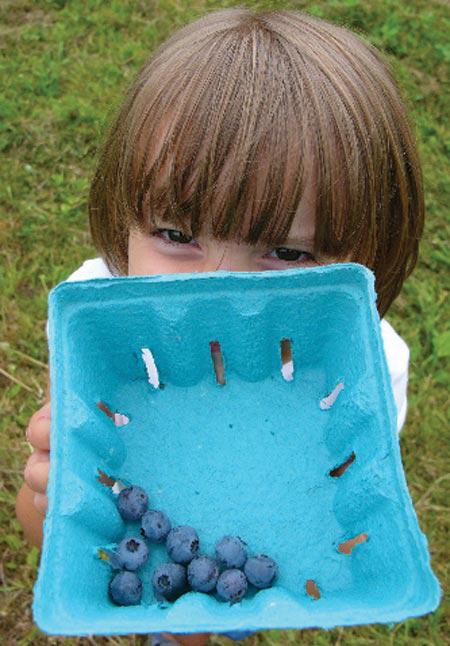Farm Tours in the Berkshires

People in the Berkshires of Massachusetts love local food! They search for it at co-ops, farmers markets, CSAs and anywhere else they can find fresh food produced close to home. Many of them even understand local food's importance to the community and the local economy and make choices based on that knowledge. But how many of them have walked through the fields and seen where their food comes from?
Many of us believe there's a growing disconnect between what we buy at the store and where it originated that is harming our ability to understand our planet, our society and our own health. At Berkshire Co-op Market in western Massachusetts, we are doing what we can to chip away at that disconnect.
Each growing season, Berkshire Co-op Market runs its farm tour program. We invite community members, particularly our owners, to visit area farms and see where the food they eat is produced. The events attract locals, foodies, tourists, and quite a few families—kids love meeting the animals and frolicking in the fields. Led by the host farmers, the tours are all-inclusive, educational, a beautiful walk in the Berkshire Hills and quite a lot of fun.
The farm tour program, however, means much more to us than a nice walk. Farm tours educate our customers and increase their awareness of the local food network. People meet the farmer and develop a down-to-earth relationship with local food sources. On every tour, we make sure to tell the audience what products are produced on the land and where they can get those products. We don't limit this talk to items being sold at the co-op. After all, the importance lies not in where local food is bought, but that it is bought at all.
This program offers a physical connection to what newspaper articles and our in-store educational pamphlets can only address with pictures. Vegetables are grown in the soil, apples are picked from a tree, and the eggs you scrambled for breakfast were probably laid by a chicken. Customers will never feel as connected to local food as they do once they feel the soil between their fingers, pluck the fruit from the branch, and meet those chickens.
Getting the farmers on board
The program is a success today, but quite a bit of work goes into the process. Each spring brings new farms, new tours and new challenges.
Our local farmers are some of the busiest and hardest working people we know. In growing season, running a small farm is an all day/every day sort of affair. It takes most of a farmer's time just to get the seeds in the ground and the crops on our shelves. How do we steal their precious time to show our shoppers their farms?
The process starts in the off season. In the middle of winter, we host an annual grower/vendor forum. We hold these meetings with needs like crop planning, food policy, and delivery schedules in mind. But primarily they exist to open up communication between our retail environment and their agricultural one.
Our Communications Department maintains a strong presence at these meetings, and this is where we start the conversation about farm tours. While the produce manager talks about bunch size and the nonperishables manager talks about our product development assistance program, co-op communicators talk about ways that our local producers can build their relationships with the community and lead the charge to increase awareness of their own mission. I should note that we consider local product to be our premium product category and market it accordingly in the co-op with photos, descriptions, prime shelf space, and focused sales fliers.
Once we lay the groundwork in the off season, we are left with a complex schedule-building project. The season spans the New England harvest months. It starts with maple syrup (a pancake breakfast makes this one a favorite), continues through summer fruits and vegetables, and ends with apples. Somewhere in between, we'll visit with cows, lambs, bread bakers and chocolate makers. (We know bakeries and chocolate factories are not farms, but we also tour producers that fall under the category of locally made, and they are an important part of our local food scene.)
We need to build the schedule according to season and farmer availability, determine what crops and products the tour will include and who will lead it. We hope to end up with a strong schedule of one or two tours a month that vary in substance and time of day in order to keep the participants interested week in, week out and engage with as much of the population as possible.
Getting the customers on board
It is not enough that we know the tours are fun and important to the community. We need to share that information with our shoppers. We run an aggressive publicity campaign, including posters, emails, and social media. The tours are marketed as a great event for kids, a wonderful country stroll, and an educational experience. But nothing gets more emphasis than the connection to local food and conscientious grocery shopping. With every form of communication we pursue, the message is clear: "This Is Where Your Food Comes From."
We also realize that one-on-one conversation is perhaps the most important marketing tool that we have. Because of this, we encourage all co-op employees to attend farm tours, and we pay them for their time when they do attend. This way, they have firsthand knowledge when speaking to customers; we consider this part of our employee training program.
We put emphasis on the co-op's mission to support and grow the local food network. We make sure that the visitors are aware of the connection between that mission and farm tours. And we hope and expect that they leave the tours with a greater understanding and devotion to local food. And we have a whole lot of fun in the process. Anyone up for a walk?







